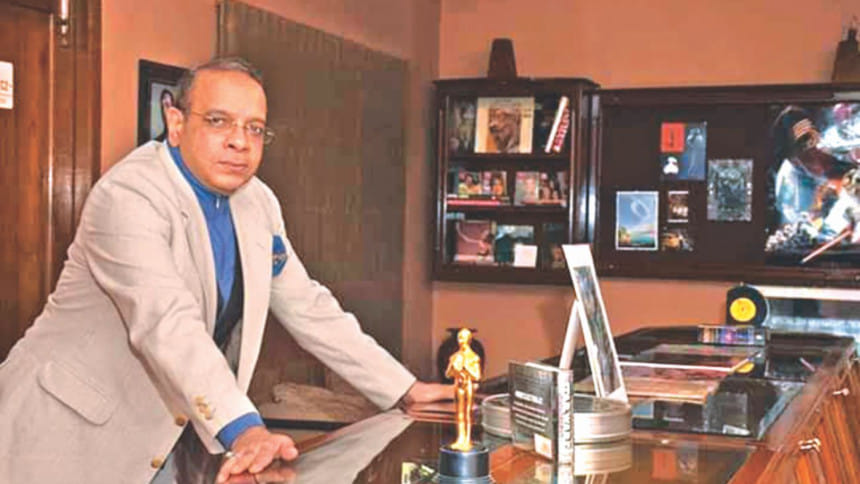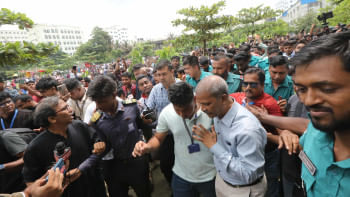Archiva

It was around the year 2003, Indian crooner Anuradha Padwal was going to have a live performance in the prestigious Dhaka Club and I was to host the show. Earlier, my childhood friend Justice Dr. Syed Refaat Ahmed had given me a hint that he would like to request some songs. As the show proceeded, I was on stage, he quietly handed me a very small chit with his requests.I opened the chit and my eyes were almost popping off! It had names of the songs, name of the film, name of the artist and the year the film was made, all in a small chit, a complete bibliography of six/seven songs.His meticulousness struck me, and I wondered how sometimes you spend your entire life knowing, befriending someone and suddenly with the discovery of one small trait you realize; so much is yet to be known.
Thus started my journey to know my friend better who has been an aficionado collector since the late 1960s of film, music and theatre memorabilia, recordings, magazines, books, pamphlets, filmographies etc. I remember when Aishwarya Rai (2003) was featured in the front page of the Time Magazine, Refaat brought out the issue where Parveen Babi was featured as the first Bollywood star in 1976! He shared his penchant with his friends. Being a very meritorious student he has always had outstanding results in St. Joseph's School, Dhaka College, then honours in law from Dhaka University securing a first class first. He went to Wadham College in Oxford University and later earned his PhD from the Fletcher School of Law and Diplomacy in Boston,USA. During his stint in Boston,I used to hear from his mother National Professor Sufia Ahmed about his attention to details and his knack for archiving pictures of his daughter Roshanak, dates and places, times and moments all noted with precision, saved in boxes, year-marked in his small Boston apartment.
Refaat came back to Bangladesh after working for the UNHCR and he was carefully nurturing his legal career, life's path and that of his daughter while looking after their chambers Syed Ishtiaq Ahmed and Associates. Justice Refaat Ahmed was elevated to the Bench in 2003 and his father Barrister Ishtiaq Ahmed passed away in the year 2003.
In a flat in Dhanmondi, Dhaka, his long cherished Archiva was inaugurated in December 2010. It is a private archive-exhibit curated by him. The exhibits on display are part of a larger collection and have been selected as a personal tribute to icons from the selected world of film,theatre, television and music. When I entered for the first time, there was a corner for the first long play record from Bangladesh, produced by Jamil Chowdhury,a Tagore collection including a wonderful rendition by Iffat Ara Dewan, Era porke apon kore aponare por. Perhaps Refaat's collection is a ploy to bring these luminaries close to the heart. His favourite Ferdausi Begum's LP, one of Shahnaz Rahmatullah, Farida Khanamare all displayed with splendor. Lighting, furniture, choice of angle, every detail has been created with care. His own yester years and crazes with which we grew up...The Beatles, Carpenters, Elton John, Walt Disney, his birth year i.e. 1958 finds a corner.
But, in all, the exhibits are rather open ended in their theme and objective. Archiva's collection has over the years notably expanded to also cover works of scholarship and generally attainments by individuals known and close to the Curator through various forms of association. Justice Ahmed says, "These objects transcend time and evoke wistful affection of a cherished former era."
His daughter Roshanak who took her schooling in Los Angeles and Dhaka, earned her bachelors from UC Santa Barbara shares his penchant for photography and archiving.
Justice Ahmed's Facebook is also an interesting journey through his life, travels, reading, and collection of friends, representing physical and metaphysical aspects. Summed up in his own comments on his Facebook page "To be an archivist requires an even more humble and generous spirit than to be a historian."
To quote Justice Ahmed, Archiva's motto is perhaps best encapsulated in the following quote from Orhan Pamuk's The Museum of Innocence. "The power of things inheres in the memories they gather up inside them, and also in the vicissitudes of our imagination, and our memory-of this there is no doubt."
Nashid Kamal is a Professor of Demography, Nazrul exponent and translator.

 For all latest news, follow The Daily Star's Google News channel.
For all latest news, follow The Daily Star's Google News channel. 



Comments